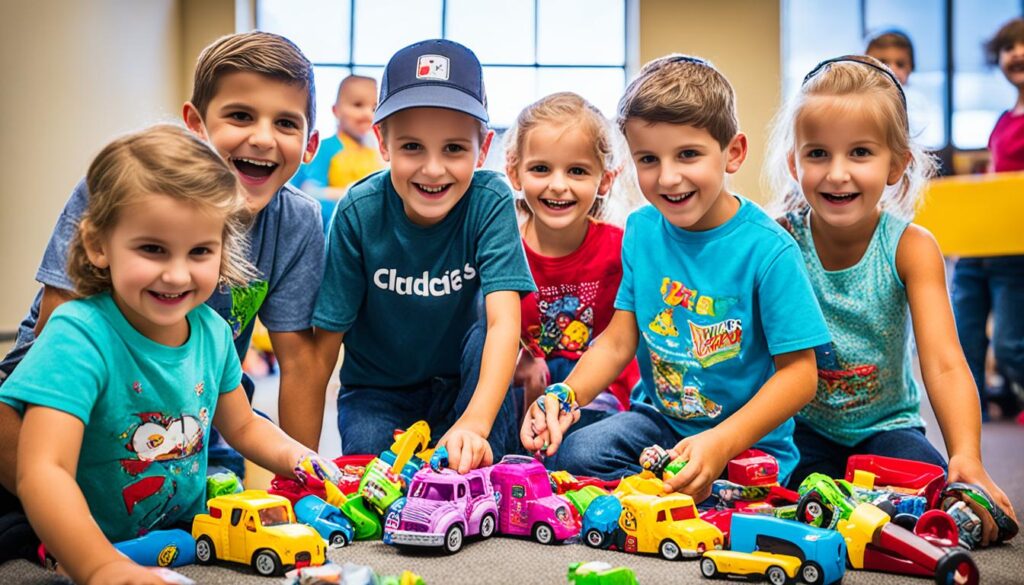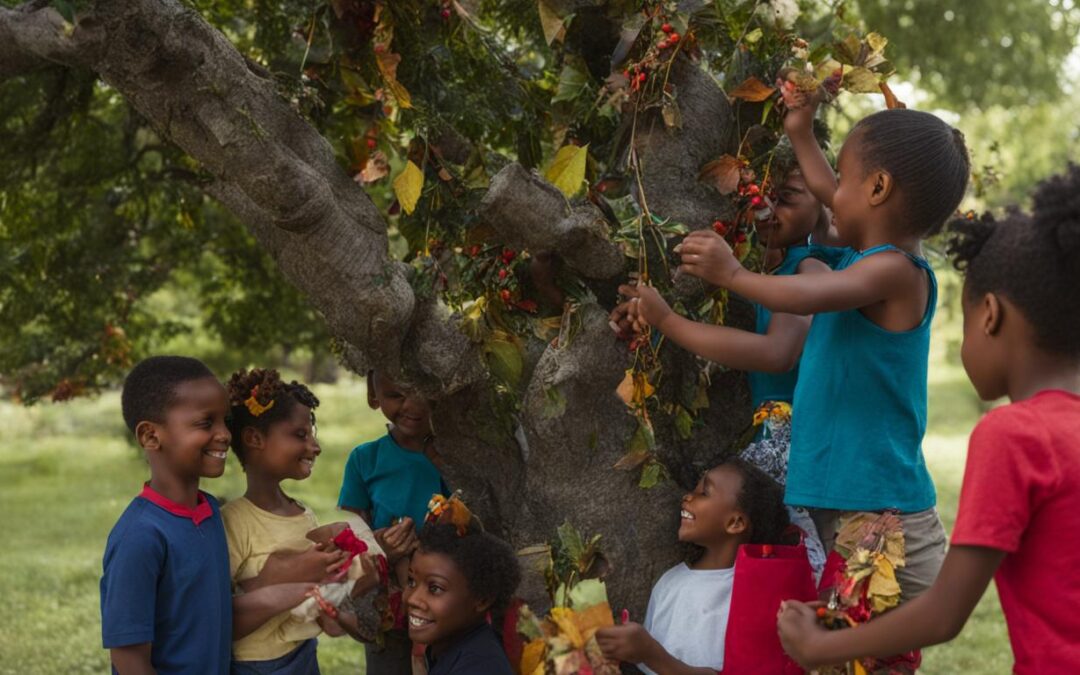Teaching children about gratitude is crucial for their social and emotional development. Not only does it improve their relationships and empathy, but it also contributes to their overall happiness. As parents, you have the power to instill gratitude in your kids and shape their perspective on the world. By teaching them the value of giving back and appreciating the blessings they have, you can help them become compassionate and grateful individuals.
In this article, we will explore various effective ways to teach children gratitude and the importance of giving back. From modeling gratitude to encouraging acts of kindness, from discussing the less fortunate to turning interests into action, there are plenty of strategies you can incorporate into your parenting approach. Through these methods, you can create a lasting impact on your children’s lives and nurture their sense of gratitude.
Let’s delve into each of these strategies and discover how you can effectively teach your children about gratitude and the joy of giving back.
The Power of Modeling Gratitude
Children learn a lot by observing their parents’ behavior. As a parent, you have the power to teach your children about gratitude by modeling it yourself. When you show genuine appreciation and express gratitude, your children will learn the importance of being grateful.
One of the simplest ways to model gratitude is by saying “thank you” to others. Encourage your children to say “thank you” when someone does something kind or helpful for them. By doing so, they will not only learn to appreciate others but also understand the impact of their words.
It’s important to show appreciation to your children as well. Acknowledge their efforts and actions, no matter how small they may seem. By recognizing and appreciating their accomplishments, you teach them that gratitude is a two-way street.
Modeling gratitude also means recognizing when someone goes above and beyond. When someone goes out of their way to help you or your children, make sure to express your sincere appreciation. This will reinforce the value of gratitude and teach your children to appreciate the efforts of others.
Remember, your actions speak louder than words. By modeling gratitude, you teach your children an important life lesson that will shape their character and relationships.
| Benefits of Modeling Gratitude | Ways to Model Gratitude |
|---|---|
| 1. Enhances relationships | – Say “thank you” to others |
| 2. Builds empathy | – Appreciate your children’s efforts and actions |
| 3. Fosters happiness | – Recognize when someone goes above and beyond |
Encouraging Acts of Kindness
Encouraging acts of kindness is a powerful way to teach children about gratitude and showing appreciation. By fostering a culture of kindness, parents can help their children develop a deep sense of gratitude for the people and the world around them.
To instill this value, parents can start by discussing with their children how showing appreciation makes others feel. By sharing personal experiences of receiving thanks and explaining the positive impact it had, parents can help their children understand the value of expressing gratitude.
One effective way to encourage acts of kindness is by exploring different ways that children can express their gratitude. This can be as simple as giving someone a smile or a thumbs up when they do something kind or helpful. Children can also get creative and show their appreciation through gestures like drawing a thank-you picture or baking treats for those who have helped them.
Encouraging children to think of specific individuals who have extended kindness towards them can also deepen their understanding of gratitude. By prompting them to express their thanks directly to these individuals, children learn the importance of acknowledging others’ efforts and develop a sense of interconnectedness and appreciation for the support they receive.

Exposing children to acts of kindness not only teaches them gratitude but also cultivates empathy and compassion. When children witness the positive impact their kind actions can have on others, it reinforces the value of showing appreciation and encourages them to continue practicing acts of kindness throughout their lives.
Teaching about Less Fortunate
It is important to talk to children about those who are less fortunate to develop their compassion and gratitude for their own privileges. As parents, you have the power to cultivate empathy and a sense of social responsibility in your children.
Engage your children in gentle discussions about the disparities in the world, without overwhelming or scaring them. Explain that not everyone has the same advantages and that some people face challenges that they may not understand or experience themselves.
By teaching your children about the less fortunate, you can help them understand the importance of compassion and gratitude for what they have. This understanding can foster empathy and a desire to make a positive impact in the lives of others.
Using real-life examples and stories, you can help your children see the everyday struggles and hardships that some people face. This can be done through age-appropriate books, documentaries, or even by sharing personal experiences of encounters with the less fortunate.
Encourage your children to reflect on their own privileges and teach them to appreciate the things they often take for granted. By instilling gratitude for their privileges, you can help them develop a sense of responsibility towards helping others.
Turning Interests into Action
Encouraging children to use their skills for a good cause is an excellent way to teach them about charity and gratitude. By engaging in activities that align with their interests, children can not only make a positive impact on the community but also boost their own confidence.
Consider the following ways to teach children charity and boost their confidence:
Organizing a Fundraising Drive
Encourage your child to organize a fundraising drive for a cause they feel passionate about. They can use their creativity to plan events, such as a charity auction or a talent show, to raise funds. This hands-on experience will not only teach them the importance of giving back but also build their organizational and leadership skills.
Participating in a Charity Run
Many charitable organizations organize fundraising runs or walks that children can participate in. This gives them an opportunity to showcase their physical abilities while supporting a good cause. Participating in such events can instill a sense of achievement and gratitude in children as they see the impact of their contributions.
Hosting a Bake Sale
If your child loves baking, why not help them host a bake sale? They can use their culinary skills to create delicious treats and sell them to raise funds for a charity or a local cause. This activity not only allows children to showcase their talents but also teaches them valuable lessons about entrepreneurship and serving others.
Remember, the key is to align your child’s interests with charitable activities. By doing so, you empower them to make a difference in the world while boosting their confidence and teaching them the value of gratitude.
Making Giving Back a Family Affair
Making volunteering a family activity not only allows you to give back to your community but also teaches your children important values like gratitude and empathy. By engaging in acts of kindness together, you can create lasting memories while instilling a sense of appreciation in your children.
There are several ways you can make giving back a family affair. You can start by finding volunteer opportunities where the whole family can participate. Whether it’s helping out at a local soup kitchen, organizing a neighborhood clean-up, or participating in a charity event, working together as a family allows you to bond while making a positive impact.
Another approach is to let your children take the lead and choose a charity to support. This not only empowers them to make a difference but also teaches them the importance of making informed decisions and considering the needs of others. It’s an opportunity for them to learn about different causes and develop a sense of gratitude for what they have.
Engaging in acts of giving as a family creates a shared experience that nurtures gratitude and empathy in children. The memories you create together while volunteering will stay with them for a lifetime, shaping their understanding of the world and their place in it. So gather your family, find a cause you’re passionate about, and let the spirit of giving back deepen your bond and teach your children invaluable lessons of gratitude and compassion.

